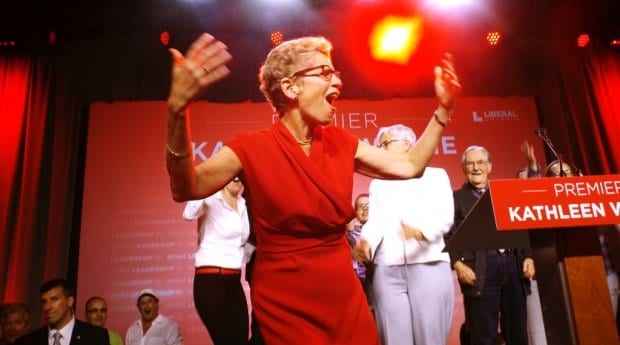It was a jubilant night for Liberals as Kathleen Wynne led her party to a fourth mandate and became the first lesbian elected premier in a general election in Canada. But the Liberals’ crushing victory spelled defeat for all 10 gay and lesbian candidates from the other parties.
Wynne pledged to get back to work as soon as possible in her victory speech, in which she also thanked her partner, Jane, and credited Ontario as being a place where absolutely anyone can be elected to its highest office.
“I am so proud to be standing in front of you as the first woman to ever have been elected as the premier of Ontario,” Wynne said to enormous cheers. “This is a beautiful, inclusive place that we live in, Ontario. And I want us every single day to treasure that. I want our kids to feel that as they grow up in our schools and understand what a gift it is to live in a place like this, where anyone can be the premier, it doesn’t matter.
“That thing I said in my leadership [race] about how Ontarians do not hold prejudice in their hearts — that Ontarians want to be an open and inclusive people — we have so proven that tonight,” she said.
The Liberal victory was also a triumph for Toronto Centre MPP Glen Murray, who returns to Queen’s Park after winning his third election in four years. His margin of victory was more than 20,000 votes over the PC candidate, as the NDP sank to third place in the riding, scoring fewer votes than they have in any election since 1999.
Openly gay Green party candidate Mark Daye doubled his vote share over 2011, but didn’t crack five percent of the vote.
Declining NDP vote share was a key story of the election in Toronto, where the party lost three MPPs. Openly gay former MPP Paul Ferreira lost his bid to return to Queen’s Park by the widest margin of his four contests against Liberal Laura Albanese.
Ferreira says the results spell the end of his quest to return to electoral politics, quashing speculation he may run for Toronto city council.
“It was a decade I devoted myself to running for political office in York South–Weston,” he says. “I was privileged to represent the riding for a short time in the legislature, and I can hold my head high and move on.”
Despite the NDP’s lacklustre performance June 12, Ferreira does not blame the party’s platform or leader for the results.
“I was proud of our platform. It was responsible, it was realistic, it was practical. It addressed the needs of the city. It addressed the needs of average working people in our city, in my riding,” he says. “The overwhelming theme of this campaign was a fear of Tim Hudak, and that had an impact in this election.”
In 2011, Ferreira blamed his narrow loss on a homophobic campaign against him in the riding, but this time he says that wasn’t an issue.
“The entire campaign, it didn’t come up a single time,” he says. “That’s partially, I think, because of who the premier is. I sincerely hope in the future for candidates who are openly gay that it simply isn’t an issue an all, and I think Kathleen Wynne’s victory will play a pretty significant role in that issue creeping up in the future.
There had been hope that the PCs may elect their first openly gay MPP but Phil Gillies’ quest to return to Queen’s Park also ran up against a strong Liberal incumbent in Brant.
None of the other queer candidates on the ballot came close to victory in their ridings.


 Why you can trust Xtra
Why you can trust Xtra


